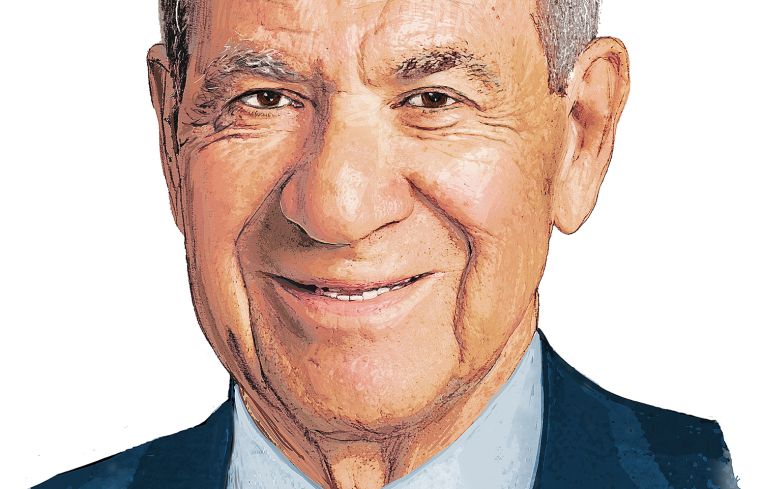REBNY 2024: The Exit Interview and This Year’s Honorees
Douglas Durst gets real on his last stint as chairman of REBNY
By The Editors January 16, 2024 1:00 pm
reprints







Jed Walentas, the incoming chairman of the Real Estate Board of New York, and his predecessor, Douglas Durst, are more alike than one might initially think.
Of course, there are certain surface-level similarities (both are developers, both come from a real estate family, both are New Yorkers) but on a deeper level they share a rare quality: They speak their minds.
Durst is just as intrepid opining on the foibles of Local Law 97 (“It’s just a misguided concept”) as he is about the annoyances of the job as chairman (“I’m not going to miss getting calls at all hours of the day and night from Jim Whelan, as much as I like him.”)
Walentas is similarly candid and critical. (Perhaps not quite as much as his father David, but give him time.) He doesn’t gild the lily when asked about the state of the industry or the rents developers like him are collecting.
Commercial Observer’s Mark Hallum interviewed both the outgoing chairman and the incoming one.
It is good for an organization like REBNY to have a person who speaks their mind at the leadership level — because the industry remains in a tremendous state of flux, and will require clear-eyed realism and truth-telling when charting its future.
The issues that will face REBNY in 2024 (and beyond) are fairly plain.
For one, there’s Local Law 97. 2024 marks the first full year that landlords are supposed to be in compliance. But are they actually complying? Some are, yes. Others have decided that the fines might be less than the cost of retrofitting their buildings. Rebecca Baird-Remba delved into these issues.
Mayor Eric Adams has taken real estate’s problems into his own hands with his “City of Yes” zoning change proposals, which would mean the biggest zoning revamp in the city since the Brooklyn Navy Yard actually made ships for the Navy and a subway ride cost 15 cents. It’s currently under review, but Rebecca examined the proposals in her story.
There’s a reason Mayor Adams is playing a role here. Property taxes remain the city’s cash cow. But CRE’s share of the tax growth is expected to be no more than a modest 1 percent in the next few years, according to the Office of Budget and Management. Abigail Nehring explored these findings.
There’s the fact that 421a still has not been replaced, and there’s a crippling housing shortage. Last week Gov. Kathy Hochul put forward some of her suggestions for combating the crisis to a less-than-receptive legislature (see Aaron’s Short’s story) as well as all the other housing problems that would flummox any brilliant mind (see Aaron’s story).
But, of course, REBNY is also about celebrating those who have helped build up the industry like Durst, Joel Picket, Elizabeth Ann Stribling-Kivlan, Fred Cerullo, Wayne Taub, Ellen Israel and Michael Rudder. Scroll through to see CO’s profiles of these figures. Oh, and there’s also the next generation of REBNY fellows, whom Larry Getlen wrote about.
Of course, there are plenty of other issues that fall under REBNY’s purview. (Did we mention the presidential election in November? Brian Pascus examined this.) But for the first time in a while we’re also seeing some optimism about one of the biggest problems facing CRE: frozen interest rates. If that’s any harbinger of the rest of the year, one can expect that Jed Walentas will be facing a very different New York in 2025. —Max Gross
Fred Cerullo
President and CEO of the Grand Central Partnership and commissioner on the New York City Planning Commission
John E. Zuccotti Public Service Award
As president and CEO of the Grand Central Partnership for nearly 25 years, not to mention his even longer career as a public servant, Fred Cerullo has seen many aspects of New York City’s commercial real estate market despite never having officially worked in the industry.
Born in Brooklyn, but a Staten Islander for most of his life, Cerullo studied English and American studies at St. John’s University before earning his law degree at his alma mater. Cerullo began developing his interest in public service while getting involved in student government. In his third year at law school, Cerullo was hired as a legislative aide by Susan Molinari, who at the time had recently been elected to the New York City Council. Cerullo never looked back, serving as legal counsel for Molinari for four years before running for and securing her former City Council spot after Molinari won a seat in Congress in 1990.
After resigning from the council in 1994 for a stint as the city’s consumer affairs commissioner, Cerullo was appointed New York City’s finance commissioner and served until the start of 1999. From there, he joined the Grand Central Partnership, which manages the business improvement district for a roughly 70-block area in Midtown Manhattan, home to some 76 million square feet of commercial, residential and retail space. In 2004, Cerullo was also appointed to the city’s Planning Commission, and has since become a board member of many other citywide organizations.
“I’m passionate about helping others, problem solving and advocating, and all of the chapters of my life to this point have connected to those themes,” Cerullo said. “I’d like to think the other theme for me [in my career so far] was attempting to always be a voice of reason and open to all sides and points of view.”
Aside from his public service career, Cerullo for many years acted in theater and television as a member of SAG-AFTRA, including occasional roles on the popular daytime soap opera “One Life to Live,” which ran for 45 seasons.
Cerullo views the achievements in his career through the lens of providing the public an access point to government, from issues as big as helping the rezoning effort for Midtown East, in order to encourage commercial development and public realm improvements, to as small as installing a stop sign in front of a woman’s house to prevent recurring traffic accidents.
“The thing that continues to keep me energized is that while there are certain elements of this that are regular and have a rhythm to them — this is the planting season, this is the music concert season — the reality is that the big picture issues affecting our neighborhood are changing all the time,” Cerullo said. “That keeps us on our toes. I love policy, legislation and understanding the impacts they may have on our small business and development community, and quality of life, which has become a particularly important issue for all of us, because we are in the quality-of-life business. That keeps us always looking toward the future.” —Nick Trombola
Douglas Durst
Chairman at The Durst Organization
Harry B. Helmsley Distinguished New Yorker Award
Douglas Durst is hanging his hat on his time as chair of the Real Estate Board of New York by receiving the Harry B. Helmsley Distinguished New Yorker Award.
The current chairman of The Durst Organization, Durst has served under the same title for REBNY since January 2021 during what turned out to be the most challenging market since at least the financial crisis 15 years ago. He was nominated for the role in fall 2020, with a once-in-a-century health crisis about to crash against New York City’s shores. To say the least, COVID-19 was the biggest surprise of his chairmanship, Durst said.
Durst’s own properties have passed the trauma in solid shape. The organization’s 151 West 42nd Street, for instance, is now 96 percent leased compared to being almost vacant three to four years ago, and there’s strong occupancy in the World Trade Center campus. Most of the office buildings in the Durst portfolio, in fact, are leased up, meaning the company will likely sit out any housing conversion wave. But one building that will be transformed into a more modern office with a $150 million investment is 825 Third Avenue, a tower that The Durst Organization built in 1969.
Despite the reckoning for office that COVID spurred, residential seems to occupy the most real estate within Durst’s mind, at least as pertains to REBNY. For instance, the saga of a residential development in Harlem called One45 gave Durst some hope in the city’s future ability to produce desperately needed apartments. The City Council member who initially blocked One45 chose not to run for re-election in the face of criticism, and the proposal has since been revived.
“We’re finally starting to see some success now that the City Council is realizing that it just cannot block any new project. That’s a somewhat hopeful sign,” Durst said, referring to other projects that are getting more positive attention from policymakers.
Durst also said he wanted to see a revival of something like the 421a tax abatement for multifamily development. State lawmakers have not passed anything like it since 421a expired in mid-2022, despite lobbying from REBNY. And Durst, long one of the city’s greener owners, is no fan of New York’s recently in-effect Local Law 97, which aims to cut buildings’ carbon emissions. He says it will likely have the unintended effect of emitting more carbon as landlords hustle toward compliance.
As Durst passes the REBNY baton to Jed Walentas, principal of Two Trees Management, his advice for his successor is simple: “Continue to be Jed Walentas. … He doesn’t really need my advice.” —Mark Hallum
Ellen Israel
Executive managing director at JRT Realty Group
Louis Smadbeck Memorial Broker Recognition Award
Before her time as executive managing director for JRT Real Estate, before her tenure as transaction manager for Verizon at Cushman & Wakefield, before beginning her career with her father, George Israel, Ellen Israel wanted to become a spy. According to her mother, at least.
Although her father was a commercial real estate industry veteran, Israel opted for a bachelor’s in political science at Ithaca College, before attempting a graduate program at George Washington University’s Institute for Sino-Soviet Studies in Washington, D.C.
“My mother would call me every morning to tell me that ‘Jewish women do not become spies,’ ” Israel recalled.
But before she could get her hands on vodka martinis and Aston Martins, Israel became ill and decided to fly home to New York for a surgery. The day after her flight, on Nov. 4, 1979, Iranian students seized the U.S. embassy in Tehran and took more than 50 Americans hostage. One of her professors at the time, who also worked for the Pentagon, left her class to presumably help manage the infamous standoff, she said. But, for Israel, it was just too intense — she elected to stay home in New York rather than finish her degree. By the following spring, her father had convinced her to start working with him at N. Peter Burton, a real estate management firm.
Israel soon made a name for herself with her sale of a 1 million-square-foot building, owned by Ford Motor Development, to a pair of prominent New York City landlords for $40 million. She never looked back. In the decades since, Israel has managed sale and lease transactions totaling over 25 million square feet. She currently works for JRT Realty Group, the country’s largest certified woman-owned commercial real estate business.
To this day, Israel is still brokering major deals across New York. This past summer, she co-represented the City of New York, on behalf of the New York City Administration for Children’s Services, in its signing of a 640,000-square-foot lease at 110 William Street. It became the city’s second-largest lease of the year. She also spends time mentoring young women in the industry, both independently and through REBNY, of which she has been a member for decades. In fact, winning the Louis Smadbeck Memorial Broker Recognition Award is something of a full-circle moment for Israel because she met Smadbeck’s son, Paul, back in their school days. The younger Smadbeck was the first person Israel called after learning she had been chosen for the award this year, she said.
Her best piece of advice for those she mentors? It’s all about the relationships one makes with people on all sides of the table. One consistent thing about the industry is that it goes up and goes down — it can be a buyer’s market and then a seller’s market, Israel said. So keeping the lines of communication open, even during the slow times, is absolutely essential for success.
“If you buy into that concept, then, in times like now, you will realize that your advice and counsel to tenants, and buyers and sellers, is as critical now as it is in a market where everyone’s making deals,” Israel said. “Now, today, everybody should be going through their Rolodex and calling all their clients from last year if they haven’t been in touch, because every other broker is doing that. … This is a part of the business. You’ll never hit the top, you’ll never hit the bottom — you always need to be there, because this is the cycle of the business.” —N.T.
Joel Picket
Chairman of the Gotham Organization
Bernard H. Mendik Lifetime Leadership in Real Estate Award
Joel Picket was in his 20s when he took over the family business, a contracting firm then known as Gotham Construction.
His grandfather, Nathan Picket, founded the company shortly after the turn of the last century and later gave the reins to his son, David Picket. The third-generation Picket found himself at the helm rather suddenly in 1966, shortly after his father’s death, when Joel was barely out of graduate school.
At that time, Gotham Construction thought of itself as “just a contractor, building for other people,” Picket said. So he set out to change that over the next three decades.
“I said to myself, ‘Boy, you know, the builder is really taking a lot of a risk here,’ ”
Picket said. “I should be developing this stuff myself.”
The decision was well timed. Gotham got in on the ground floor of affordable housing development in New York.
The New York State Legislature had just passed the moderate-income cooperative housing program called Mitchell-Lama, and Gotham volunteered to develop some of its pioneering projects, including Tower Gardens, Bronx Park East and Mayflower Terrace, all in the Bronx.
Since then, Gotham has continued to grow on a national scale as a contractor. Closer to home, its portfolio has expanded to include a variety of residential and retail developments.
During Picket’s tenure as CEO from 1966 until 2018, Gotham completed some 30,000 residential units in the New York area with plenty of affordable housing projects, including state-subsidized 80/20 projects — which set aside 20 percent of units for low-income households — along with Section 8 housing and others using U.S. Department of Housing and Urban Development financing.
“We’ve tended to develop in areas that are just burgeoning,” Picket said. “On the Upper West Side, for example, in the mid-1980s. And we’ve done developments in Hell’s Kitchen.”
He also undertook one of the city’s first office-to-residential conversions using the J-51 tax exemption program with the redevelopment of 244 Madison Avenue between East 37th and East 38th streets in 1984.
And, during his tenure, he even crossed paths with infamous master city planner Robert Moses when Moses was at the height of his power in the 1960s. When Picket reached out to Moses to buy air rights over the Cross Bronx Expressway, he got a “scathing” letter back, Picket said.
Picket’s own son, David Picket, joined the company in 1991 and now serves as CEO, with Joel Picket staying on as chairman. The new generation has unleashed a fresh wave of growth, including the 285,000-square-foot Harlem USA shopping center on West 125 Street and Frederick Douglass Boulevard.
The company completed the next iteration, DC USA, in 2008. The Washington, D.C., shopping center is more than three times the size of its New York counterpart, with 890,000 square feet of retail space. DC USA is 85 percent leased today and has helped establish Gotham Construction in the retail sector.
Joel Picket is currently a member of REBNY’s board of governors and previously served on the executive committee.
He’s also a member of Lincoln Center’s Real Estate and Construction Council and has held a number of other industry leadership roles, including director of the National Housing Conference. —Abigail Nehring
Michael Rudder
Founder and principal at Rudder Property Group
Young Real Estate Professional of the Year Award
For Michael Rudder, specialization is the name of the game.
The success of his business is evidence of his commitment to his field of expertise. Rudder Property Group is the only real estate services firm in the New York metropolitan area that focuses entirely on the sale of office condos.
“I believe specialization is the way, especially in New York,” Rudder said. “There’s a lot of different areas — whether it’s geographic specialization or product type — for somebody to really separate themselves from the large pack of other brokers or real estate professionals in our industry. I found this niche, but I think there’s hundreds or thousands of other opportunities like it. To me, I think it’s very important to be the best at whatever area of the market you decide to pursue.”
Yet it still took a number of years in the industry before Rudder could carve out his niche. The South Orange, N.J., native (who is a youthful 45) studied anthropology at Ithaca College, an alma mater he shares with fellow 2023 REBNY award winner Ellen Israel. Rudder’s father is a landlord who owns a number of small strip retail centers around New Jersey, so Rudder received some industry exposure in his youth, but it wasn’t until after a stint in Colorado following his graduation that he found his real work passion.
Rudder moved back to New York in the early 2000s, with the intent of building a real estate career after becoming interested in the business while working at an industrial development firm in Denver. He landed a gig working for Francis Greenburger at Time Equities, to whom Rudder credits much of his skill and entrepreneurial inspiration, and eventually rose to become the firm’s director of office leasing and sales.
By 2006, Time Equities had found itself with a large office rental building at 125 Maiden Lane in Lower Manhattan “on the verge of emptying out,” as Rudder puts it. A different firm may have transformed the property into a residential building, as was common at the time, but Time Equities instead opted to convert it into office condominiums, helping to pioneer the trend in Lower Manhattan in the process. The project was a massive success for the firm, and for Rudder, who was in his mid-20s at the time, and it sowed the seeds of what would become his future business. At the tail end of the financial crisis in the late 2000s, Rudder ultimately decided to chart his own path, founding Rudder Property Group in 2010.
The firm has become a leader in New York’s office condominium space, involved in the acquisition, conversion, marketing and sales of more than 2 million square feet of properties, together valued at over $1 billion. Rudder also serves on REBNY’s brokerage sales committee — a position he takes particular pride in as the head of a small, independent firm.
That’s not to say his company hasn’t had its share of challenges, however. The depressed state of the office market in New York City post-COVID is no secret. Rudder said sales velocity was down almost 70 percent last year, not to mention property values. But he views these conditions through the lens of opportunity rather than as hindrances.
“We all know this business, particularly New York real estate, is cyclical, so it’s prudent to prepare for times like this,” Rudder said. “We see this as a time to strengthen our sword and get our processes better, be ready for some sort of return to normalcy, which we do expect to come because nothing ever stays the same. And we’re primed and ready for it.” —N.T.
Elizabeth Ann Stribling-Kivlan
Senior managing director at Compass
Kenneth R. Gerrety Humanitarian Award
Born and raised in New York, Stribling-Kivlan is the daughter of Elizabeth Stribling, the famed real estate broker, founder of Stribling & Associates, and a recipient of REBNY’s 2018 lifetime achievement award. Stribling-Kivlan said that watching her mother’s success from an early age reinforced the belief that she really could do anything she put her mind to.
“I grew up with the exceptional sense that I could always do whatever I wanted, because I saw my mother do it,” Stribling-Kivlan said. “My mother never let anyone, no matter who they were, stand in her way. It was, ‘I’m going to do this right, I’m going to do this ethically, I’m going to build my business based on the brand that I believe works for us.’ So I grew up with the mentality that if I tried hard enough, I could make it happen.”
That’s not to say Stribling-Kivlan always wanted to follow in her mother’s footsteps, however. For much of her early life, in fact, getting into the real estate industry was the last thing on her mind. She studied comparative world religion at College of the Holy Cross in Worcester, Mass., focusing on Hinduism, with the idea of becoming a professor. After graduation, she moved to San Francisco for a brief stint at culinary school. But life as a chef wasn’t meant to be, either.
With rent to pay, Stribling-Kivlan reluctantly followed her mother’s advice to apply to real estate jobs, landing a gig as an assistant to a top broker at Pacific Union. Much to her surprise, she quickly fell in love with the industry.
After a few years on the West Coast, Stribling-Kivlan returned to New York to work as an agent for her mother’s business, selling properties uptown, downtown and in Brooklyn, where she was involved with the One Brooklyn Bridge Park project, the conversion of a Brooklyn Heights warehouse into a 449-unit apartment building. She eventually worked her way up to director of sales for Stribling’s downtown Manhattan offices, before taking over her family firm as president in 2013.
Although Stribling-Kivlan and her mother had received plenty of offers to buy their firm over the years, she said that selling didn’t quite feel right until Compass came along in 2019. Stribling-Kivlan said her friendly relationship with Compass CEO Robert Reffkin, their shared ethos, and the possibility of national expansion made the decision an easy one.
Stribling-Kivlan is also well known for her advocacy within the LGBTQ+ community. As an openly gay woman, she is fiercely passionate about LGBTQ+ issues, particularly regarding children who lack a support network like the one she had growing up, she said.
For nearly a decade she served on the board of the Gay, Lesbian and Straight Education Network (GLSEN), which aims to end bullying and harassment in schools based on sexual orientation and gender identity or expression. She also served on the board of the New York City Anti-Violence Project, which supports survivors of violence who are LGBTQ+or live with HIV. She is also strongly involved with REBNY, with a seat on its residential brokerage board and a former seat on its residential RLS board. She has also taught ethics and participated in myriad panels over the years.
“I believe everybody deserves the right to live as they are and not have to live a lie,” Stribling-Kivlan said. “That’s really important to me because I was given that privilege, which is really exceptional because that’s just not the case for everybody. To me, the real courageous people are the kids who stand up freely in the very marginalized parts of this country.” —N.T.
Wayne Taub
Executive managing director of operations, Jack Resnick & Sons
George M. Brooker Management Executive of the Year Award
After 30 years in the real estate business, Wayne Taub is managing nearly 6 million square feet of commercial space and 1,000 apartments for commercial landlord Jack Resnick & Sons.
Taub, a native of Spring Valley in New York’s Rockland County, had grown up on construction sites and in the real estate world with his father, a structural engineer in New York City who retired three years ago at the age of 87.
The younger Taub, now 57, started out in his 20s collecting rent, handling purchase orders, and doing other low-level administrative work at an office building in Manhattan. He slowly progressed up the ladder to building manager and, eventually, to executive roles in management and operations. He had studied business at Rider University in New Jersey for his bachelor’s, and, after a few years of working as a property manager, earned a master’s in real estate from New York University’s Schack Institute.
At Jack Resnick, Taub handles everything about building operations, including leasing, construction, tenant improvements, building upgrades and energy-efficiency measures. He also oversees human resources, information technology and building insurance issues. Before starting his current role at the beginning of 2021, he spent 11 years doing a mix of leasing and property management at the company then known as Time Warner.
His crowning achievement at the media company was leading the charge to consolidate the company’s offices into a single location, which ultimately became 30 Hudson Yards. Time Warner purchased its 1.5 million-square-foot office space in the tower for an undisclosed amount in 2014 while Related Companies was still constructing the 100-story skyscraper. However, by 2019, the company’s fortunes had turned, and what is now known as WarnerMedia completed a sale-leaseback of its condo for $2.2 billion to Related Companies.
Before joining Time Warner, Taub worked at CBRE (then CB Richard Ellis) for 11 years, managing a portfolio of 11 million square feet of office. Before leaving CBRE, he moved to the corporate services division and ran the account for the McGraw Hill Companies, getting a taste of the kind of corporate real estate management he would end up doing at Time Warner.
Taub is also involved with the Real Estate Board of New York and serves on the trade group’s management board of directors.
“I find the organization to be incredibly helpful in addressing challenges that we as owners in New York City face every day in running our buildings,” he said. “We’re able to influence policy to the extent that we can, control our destiny, and sort of shape the future for ourselves as real estate owners and managers.”—Rebecca Baird-Remba

![Spanish-language social distancing safety sticker on a concrete footpath stating 'Espere aquí' [Wait here]](https://commercialobserver.com/wp-content/uploads/sites/3/2026/02/footprints-RF-GettyImages-1291244648-WEB.jpg?quality=80&w=355&h=285&crop=1)

